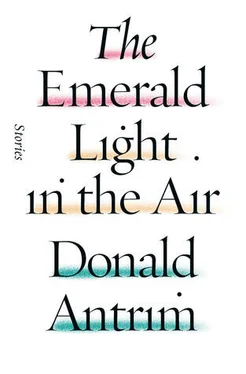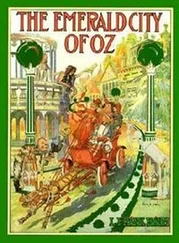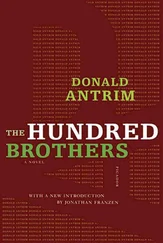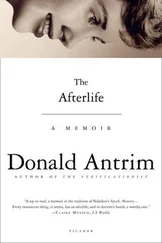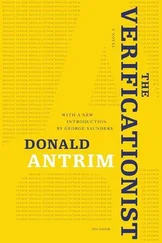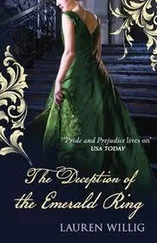Donald Antrim
The Emerald Light in the Air
Lee Strasberg, a founder of the Group Theatre and the great teacher of the American Method, famously advised his students never to “use”—for generating tears, etc., in a dramatic scene — personal/historical material less than seven years in the personal/historical past; otherwise, the Emotion Memory (the death of a loved one or some like event in the actor’s life that can, when evoked through recall and substitution, hurl open the floodgates, as they say, right on cue, night after night, even during a long run) — this material, being too close , as it were, might overwhelm the artist and compromise the total control required to act the part or, more to the point, act it well; might, in fact, destabilize the play; if, for instance, at the moment in a scene when it becomes necessary for Nina or Gertrude or Macduff to wipe away tears and get on with life; if, at that moment, it becomes impossible for a wailing performer to pull it together; if, in other words, the performer remains trapped in affect long after the character has moved on to dinner or the battlefield — when this happens, then you can be sure that delirious theatrical mayhem will follow.
What is the point in all this? Strasberg was wrong. Seven years are not enough, a fact I discovered recently during a twilight performance of A Midsummer Night’s Dream , presented on the college green to commemorate the founding, a hundred and fifty years ago, by the Reverend William Trevor Barry — my great-great-grandfather on my father’s side — of the small liberal-arts institution that bears our family’s name and our seal. I am Reginald Barry, Dean of Student Life and Wm. T. Barry Professor of Speech and Drama at Barry College, so naturally it fell to me to direct our commemorative, barefoot production of Shakespeare’s great festive comedy. While I was at it, I decided to serve up some ham myself, as Lysander. What would a skinny, balding, unmarried, childless forty-six-year-old Lysander — a PhD with hair on his back— mean within the context of an otherwise college-age show? I’m not sure I can answer that question. Normally, Lysander would be essayed by some good-looking lacrosse goalie waiting his turn to date-rape the beautiful, waifish Mary Victoria Frost, our Hermia, only a sophomore herself and already the finest actress we’ve had in my time at Barry, a sure candidate for Yale, or Juilliard if she can ease off the drugs. I might stand in as Egeus or Theseus, or maybe Oberon, King of the Faeries, if I felt up to it. But high-concept casting is a director’s prerogative. Two seasons ago, we mounted an all-male, all-nude Taming of the Shrew . People said it increased their appreciation for the radical potentials in Elizabethan drama.
And so, the play. Four adolescents turned out by law and their parents into a green world governed by spooks, all playing — children and their phantoms — at love and nighttime evil.
The adolescents were me, Mary Victoria Frost, Sheila Tannenbaum, as Helena, and Billy Valentine, as Demetrius. Sheila, a junior, plays character parts when she’s not playing basketball for the Lady Bears, and I knew she’d make an acceptable if not entirely agreeable Helena, with her big hands and lurching walk and brown eyes too far apart on an otherwise bent-looking, asymmetrical face; but Valentine represented a casting risk. Valentine is a certain kind of blond-haired, upper-middle-class boy — the type is familiar at any private school in the land, I would imagine — a sarcastic, wiry little underachiever who, on the basis of no evidence, is rumored among his peers to be a genius.
“Don’t come to rehearsals stoned, Billy,” I warned this kid before first read-through.
“ Stoned , Mr. Barry?” He laughed. The previous Friday, a bunch of us had found ourselves lying around on sofas in my office in Lower Hancock, getting wasted on some of Billy’s very strong homegrown.
“We’re here to work,” I told him now, and he said, “Don’t you think I should be playing Puck?”
“You want to direct this show, Valentine?” I asked him. “No? Then let me worry about casting.”
“Hey, Mr. Barry. Everything’s cool. It’s just that Martin can’t read his script. I mean, he can’t see .”
Billy Valentine had a point. Putting Martin Epps in as Puck was like putting, well, I don’t know what into what. How can you defend a totally blind Robin Goodfellow tapping his way around the stage with a telescoping cane, except in theory?
Dramaturgically speaking, the theory was sound enough, I thought; and so I opened up rehearsals by reciting it — in somewhat oblique form — to my cast. There they were, the “drama mafia,” down in the windowless Hancock Hall basement, twenty-five or thirty hungover Lovers, Royals, Spirit Wraiths, Merry Men, stagehands, set techies, and walk-ons, all dressed in late-spring cutoffs and oxford-cloth shirts and sheer halter tops, almost every one of this lot — except Martin Epps, the blind boy — inhaling drags off cigarettes; it was a bored, blasé-looking crowd. “Genuine vision, expressed artistically by Shakespeare in the character Puck, is more than the ability to open your eyes, take a look around, and see what’s wrong with your life,” I announced to these oversexed dope addicts.
No one spoke or even looked up, and I had that terrible feeling I get at the kickoff to any rehearsal period, when I realize how much disappointment lies ahead. I said, “Well, anyway, Theseus, it’s your line to start the play.”
Still no one spoke. “Danielle, do you have the cast list?” I asked my sophomore stage manager.
“Hang on, Mr. Barry, it’s here somewhere.”
“Call me Reg,” I told her. “During the play, we’re all equals.”
She stared at me like she wasn’t quite sure. Unorthodox etiquette is often perplexing for the young. She held up the cast list and waved it — apparently some kind of “theatrical” gesture — in the air over her head. “Greg Lippincott, you’re Theseus.”
“Oh, is that how ‘Theseus’ is pronounced?” Greg asked. It was hard to believe he was one of the Philadelphia Lippincotts. He took a puff from his cigarette. Snickering could be heard. It took four hours to complete the read-through. Danielle delivered Martin Epps’s lines to him, and Martin repeated each back, painstakingly, one word then the next, like a spy being briefed on a plan.
“I’ll put a girdle round about the earth in forty minutes,” recited Danielle.
“I’ll. Put. A girdle. Round about the earth. In forty minutes,” said Martin.
I made a note to ask him to pick up the pace and not tap cadences on the floor with his cane. I made another note, to Jim Ferguson, warning him to avoid inserting “like” into Oberon’s speeches to Titania. I worried about telling the faeries and goblins that their costumes would consist of G-strings and pasties.
I can always give thanks, in these delicate situations, for our costumer, my girlfriend, Carol.
Carol came in later in the week, during our first walk-through rehearsal, and made the case for her skimpy outfits.
“I think we will be able to see from their attire that these faeries are playful and very dangerous, earthy yet devilish, with a heightened insistence on gender that not only subverts our own male-dominated culture but underscores the young lovers’ cruelty toward one another in the Athenian grove,” she announced while staring straight at me. Was it necessary for Carol to see everything as a reflection of the sexual antagonisms in our on-again, off-again relationship?
Читать дальше
